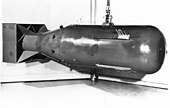
Back انتشار الأسلحة النووية Arabic পারমাণবিক অস্ত্রের বিস্তার Bengali/Bangla Nuklearna proliferacija BS Proliferació nuclear Catalan Amlhau niwclear Welsh Proliferation (Massenvernichtungswaffen) German Proliferación nuclear Spanish پروتکل الحاقی به معاهده منع گسترش سلاحهای هستهای Persian Ydinaseiden leviäminen Finnish Dissuasion et prolifération nucléaires au XXIe siècle French
| Nuclear weapons |
|---|
 |
| Background |
| Nuclear-armed states |
|
Nuclear proliferation is the spread of nuclear weapons, fissionable material, and weapons-applicable nuclear technology and information to nations not recognized as "Nuclear Weapon States" by the Treaty on the Non-Proliferation of Nuclear Weapons, commonly known as the Non-Proliferation Treaty or NPT. Proliferation has been opposed by many nations with and without nuclear weapons, as governments fear that more countries with nuclear weapons will increase the possibility of nuclear warfare (up to and including the so-called countervalue targeting of civilians with nuclear weapons), de-stabilize international or regional relations, or infringe upon the national sovereignty of nation states.
Four countries besides the five recognized Nuclear Weapon States have acquired, or are presumed to have acquired, nuclear weapons: India, Pakistan, North Korea, and Israel. None of these four are a party to the NPT, although North Korea acceded to the NPT in 1985, then withdrew in 2003 and conducted its first nuclear test in 2006.[1] One critique of the NPT is that the treaty is discriminatory in the sense that only those countries that tested nuclear weapons before 1968 are recognized as nuclear weapon states while all other states are treated as non-nuclear-weapon states who can only join the treaty if they forswear nuclear weapons.[2]
Research into the development of nuclear weapons was initially undertaken during World War II by the United States (in cooperation with the United Kingdom and Canada), Germany, Japan, and the USSR. The United States was the first and is the only country to have used a nuclear weapon in war, when it used two bombs against Japan in August 1945. After surrendering to end the war, Germany and Japan ceased to be involved in any nuclear weapon research. In August 1949, the USSR tested a nuclear weapon, becoming the second country to detonate a nuclear bomb.[3] The United Kingdom first tested a nuclear weapon in October 1952. France first tested a nuclear weapon in 1960. The People's Republic of China detonated a nuclear weapon in 1964. India conducted its first nuclear test in 1974, which prompted Pakistan to develop its own nuclear program and, when India conducted a second series of nuclear tests in 1998, Pakistan followed with a series of tests of its own. In 2006, North Korea conducted its first nuclear test.
- ^ "Strong sign of North Korean nuclear test as regime calls 6 May party congress". The Guardian. 27 April 2016.
- ^ Tannenwald, Nina (2013). "Justice and Fairness in the Nuclear Nonproliferation Regime" (PDF). Ethics and International Affairs. 27 (3): 299–315. doi:10.1017/S0892679413000221. S2CID 11753655. Archived from the original (PDF) on 12 June 2018 – via Carnegie Council for Ethics in International Affairs.
- ^ Nash, Gary B., Julie Roy Jeffrey, John R. Howe, Peter J. Frederick, Allen F. Davis, Allan M. Winkler, Charlene Mires, and Carla Gardina Pestana. The American People, Concise Edition Creating a Nation and a Society, Combined Volume (6th Edition). New York: Longman, 2007.
© MMXXIII Rich X Search. We shall prevail. All rights reserved. Rich X Search